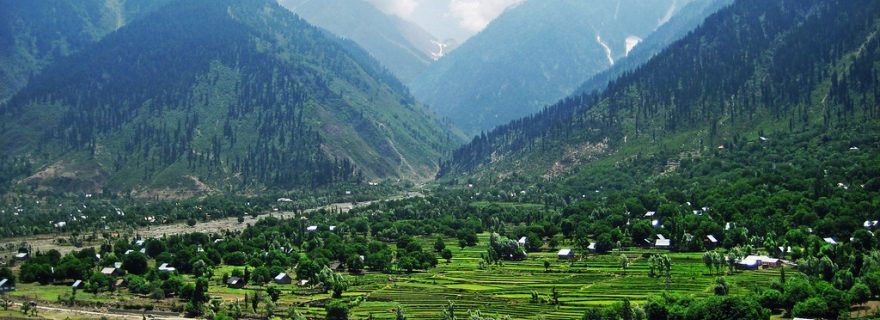A Short History of Kashmir: 1947–2019
Kashmir regularly makes international headlines but the history of the region is often unknown to many. What shaped the current situation and what is happening in Kashmir right now?
Despite the fact that Kashmir is one of the oldest surviving political conflicts in the modern world it has barely managed to receive the attention it deserves. The Kashmir conflict emerged around August 1947 soon after the partition of the Indian subcontinent into the dominion states of India and Pakistan. Since 1846, until the time of the Partition, Kashmir was a Muslim majority ‘princely state’, one among around 570 states, that unlike the ‘provinces’ were not directly administered by the British Indian government. They were small monarchies only overseen by the British, though regarded as useful allies.
At the hasty moment of the Partition in 1947, the princely states were allowed the option of joining India or Pakistan, depending upon the geographical and cultural contiguity of the state to either of these dominions and the collective will of its ruler and people, albeit the rule was not clearly specified. However, Kashmir, or rather its ruler, the maharaja, appeared to be somewhat indecisive but was eventually forced to accede to India on 26 October 1947, under extraordinary circumstances.
A tribal raid directed from the northwestern extension of the Kashmir region prompted the maharaja to seek military help from India, which was willing to provide military support on the singular condition that the maharaja accedes to India. The accession, which has been justifiably questioned—even its validity has been disputed by a few scholars—was supposed to be only a temporary one, and was to be ratified by a popular vote, a plebiscite, once the conditions in Kashmir returned to normalcy.
These provisions were duly acknowledged by both India and Pakistan after the dispute was placed on the agenda of the United Nations in 1948 to be arbitrated under their surveillance and guidance. For the temporary period, until the plebiscite was to take place, India was supposed to supervise Kashmir’s administration through a special constitutional provision: Article 370.
According to Article 370, the state of Kashmir would surrender three subjects to the dominion of India: defense, foreign affairs, and communications. For all other political matters Kashmir would depend on its own local administration, the emergency administration as it was called, set up on 30 October 1947 after the suspension of the princely rule. The administration was headed by Sheikh Mohammad Abdullah, a Kashmiri leader who was much influenced by the first Indian Prime Minister, Jawaharlal Nehru.
While Abdullah and his political party, the National Conference, commanded popular support in Kashmir, his nearness to India and Nehru was deeply resented by wide sections of the Kashmiri Muslim community (Muslims represent about 93% of the population of Kashmir), who either advocated Kashmir’s accession to Pakistan or otherwise sought an independent state outside the Indian union.
Even as Abdullah tried to forcefully suppress these contending voices he also became aware of the Indian state’s sinister designs to integrate Kashmir fully with the Indian union. It appeared India was not at all keen to ensure a plebiscite in Kashmir, despite the United Nations’ efforts, which directed many experts to the region in order to seek ways and means to conduct the plebiscite.
Simultaneously Abdullah, who was by now the Prime Minister of Kashmir, began to show his defiance towards India, leading to his removal from his position as the head of the political administration of the state, and also his arrest in August 1953 by the Nehru headed Congress government at the center in Delhi. Over the next thirty-five years through installing puppet administrators in Kashmir, subsequent Indian governments manoeuvered to integrate Kashmir fully into the Indian union, diluting the provisions of Article 370 while ensuring that plebiscite was never held in the region.
Eventually in 1989—with no options left—the Kashmiri youth took to arms to realise their political goal of self-determination, claiming that they had a legitimate right to exercise their political choice. Freedom is our right, they said. The armed movement received immense popular support in Kashmir Valley but was brutally and violently suppressed by a massive contingent of Indian armed forces operating in the state. These forces, totaling approximately around 700,000, who continue to maintain their presence in Kashmir, make up the highest concentration of army personnel anywhere in the world.
The suppression by the Indian Army led to immense human rights abuses among the Kashmiri people, including detentions, killings, rapes, disappearances, unmarked graves, etc. However, the Army was provided complete impunity by the Indian state in the form of AFSPA, i.e., the Armed Forces Special Powers Act. While the political movement in Kashmir eventually became more non-violent after 2006, it did not stop the Indian Army from abusing Kashmiris, leading to a spate of killings through the bloody summers of 2008, 2009, 2010 and 2016, with the total number of deaths in Kashmir now registered to be above 100,000, as per various sources.
By 2016, the BJP, an extreme right-wing Hindu political party had already taken over the reigns of the Indian government in Delhi, having come to power in 2014. They continued the attempts of previous Indian governments to seek complete integration of Kashmir with India, but even more forcefully and blatantly, culminating in the complete abrogation of the already attenuated Article 370.
On 5 August 2019, the Indian Home Minister informed the Parliament of the BJP government’s decision to abrogate the remaining provisions of Article 370 and make it null and void. Anticipating a backlash, the entire Kashmir Valley was placed under heavy curfew and its communication links with the outside world completely severed. The curfew and the communication blockade continue to this day, while Kashmiris desperately seek the attention and intervention of the international community in these trying moments when their voice has been totally silenced.



0 Comments